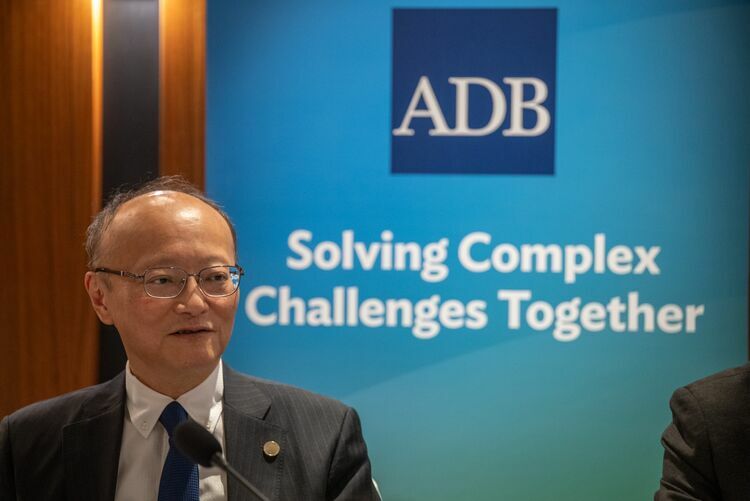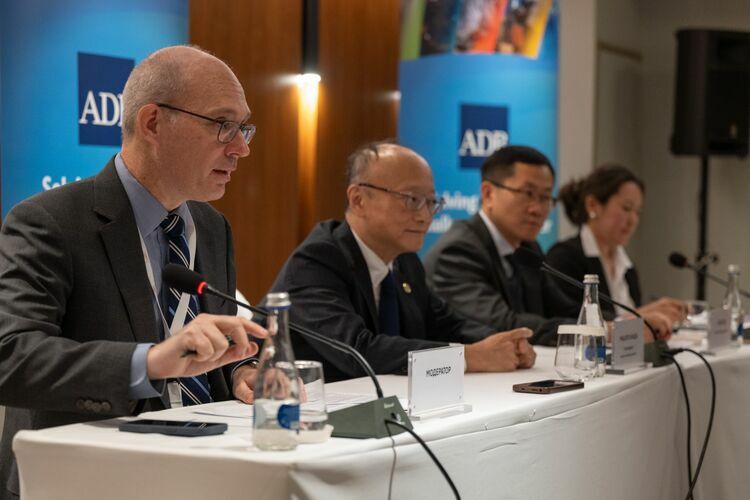Asian Development Bank (ADB) President Masato Kanda held a briefing for five major media outlets of Kyrgyzstan during his visit to Bishkek.
The ADB President outlined the bank’s plans for Kyrgyzstan and the CAREC region as a whole, stressing that the ADB views Kyrgyzstan as one of its key partners in Central Asia and is ready to significantly expand its support for reforms, infrastructure development, and climate resilience.
Regional connectivity
Responding to a question from 24-kg.com news agency about ADB’s support for large transport and logistics projects in Kyrgyzstan and the CAREC region, and what role the bank sees for itself in coordinating and financing such initiatives, and how the bank intends to ensure that the benefits reach not only large cities but also remote areas, Masato Kanda said that this was indeed a timely question.
«First of all, I would like to congratulate Kyrgyzstan on its successful chairmanship of CAREC. ADB serves as the secretariat of the program and is one of the country’s largest multilateral partners. We therefore feel a special responsibility for advancing regional connectivity.
Regional connectivity and inclusiveness are among the key priorities of our strategy. We not only finance projects but also coordinate cooperation among participating countries, providing expert support.
By 2030, we plan to invest $10 billion in CAREC transport corridors, including $4 billion in CAREC-2. It is essential that the benefits of infrastructure development reach beyond the capitals and major cities.
We aim to ensure that the impact reaches small towns, rural areas, and remote regions where the most vulnerable population groups live. That is why our projects are designed to be inclusive from the start, focusing on creating logistics hubs, improving accessibility, and connecting hard-to-reach areas with regional and global markets,» he added.
Support for the energy sector
Speaking about ADB’s support for the major hydropower project Kambar-Ata-1, Masato Kanda noted that it is of strategic importance not only for the country’s energy security but also for water resource management.
«ADB is a leading partner for Kyrgyzstan in large-scale infrastructure initiatives, including hydropower. We plan to provide $300 million in stages, starting with $140 million on concessional terms. This support will finance project preparation, implementation, and efficiency improvements.
In addition to Kambar-Ata-1, ADB is actively supporting the development of green energy.
We see significant potential for Kyrgyzstan in renewable energy — from hydropower to innovative technologies such as floating solar panels. We also intend to assist state institutions in improving energy efficiency,» he emphasized.
Electric buses for clean air
Speaking about his visit to the new electric bus project in Bishkek, he noted that the depot’s operations had inspired him.
«Electric buses are clean, quiet and easy to operate. But three things impressed me the most. First, their environmental impact: these buses significantly reduce emissions and improve air quality. Second, their inclusiveness: ramps, wide doors and comfortable boarding make public transport accessible for women with children, elderly passengers and people with disabilities. And third, the balance between environmental goals and social inclusivity. This is a model that can be successfully scaled beyond Bishkek. We will continue to expand cooperation in green transport and work to bring similar projects to other cities across the country,» Masato Kanda added.
The digital era
Responding to a question about ADB’s support for Kyrgyzstan’s digital transformation and increasing competitiveness, the ADB President emphasized that digitalization is one of the bank’s five strategic priorities.
«To strengthen our support, we have created a dedicated office focused solely on digital technologies and the introduction of digital platforms. Digitalization expands markets, reduces costs and accelerates the flow of goods and capital. It enables countries to leapfrog technologically and narrow income gaps. But it is important to consider cybersecurity, rising energy consumption, workforce retraining and digital literacy. ADB also actively supports these areas.
Today is a particularly important day: we signed the Bishkek Declaration under the CAREC Digital Corridor initiative. This is a major step toward reducing trade barriers, accelerating document processing and increasing capital flows. ADB intends to intensify its work on digital transformation in the region under Kyrgyzstan’s leadership,» Masato Kanda said.
Expanding cooperation
Journalists noted that Kyrgyzstan is demonstrating stable economic growth and asked how this might influence future cooperation with the ADB.
The ADB President noted that the country’s macroeconomic situation has indeed improved.
«This allows us to expand both the scale and scope of cooperation. In 2025–2027, ADB plans to allocate $700 million to Kyrgyzstan. This reflects a high level of trust in the ongoing reforms and the country’s economic progress. We have identified three key areas of support.
The first is boosting private investment. To achieve the goals of the National Development Strategy 2030, greater private sector participation is essential. We will support the improvement of the investment climate and the financing of small and medium-sized enterprises.
The second — support for large-scale infrastructure projects. This concerns energy, water resources, transport, and other critical areas.
The third is strengthening the country’s resilience to climate threats and natural disasters. Kyrgyzstan is highly vulnerable to the effects of climate change, and we intend to continue assisting in adaptation and risk reduction,» Masato Kanda concluded.
ADB is a leading multilateral development bank that supports inclusive, sustainable and resilient growth across the Asia-Pacific region. Working with its members and partners to address complex challenges, ADB uses innovative financial instruments and strategic partnerships to improve lives, build quality infrastructure and protect the planet. Founded in 1966, ADB is owned by 69 members, 50 of which are located within the region.








